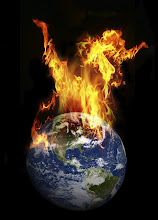The Kyoto Protocol is an agreement signed by members of the United Nations, set forth by the United Nations Framework Convention on Climate Change (UNFCCC) in 1997 and ratified in 2005.
The goal of the Kyoto Protocol is to reduce greenhouse gas emissions by 5 percent below reported levels in 1990. 37 "Annex 1" countries commit to reducing the following greenhouse gases
Carbon Dioxide
Methane
Nitrous Oxide
Sulfur-Hexaflouride
as well as
HFC's and PFC's (Flourocarbons)
Reported levels of greenhouse gases in 1990 were:
335 ppm Carbon Dioxide
1616 ppb Methane
310 ppb Nitrous Oxide
(global levels of Sulfur Hexaflouride not found)
Today, Carbon Dioxide levels have increased to above 385ppm. Methane levels are above 1750ppb and nitrous oxide levels are above 315ppb.
The Protocol places more pressure on developed nations that are principally responsible for the increase in greenhouse gas emissions at the turn of the century.
The problem with this is that, today, the nations most responsible for greenhouse emissions are developing countries just entering industrialization and attempting to catch up with already developed nations. The developing countries have substantially larger populations as well, which just duplicates the problem. If the protocol does not pressure them to commit to reducing emissions, the efforts of the treaty will be fruitless.
Another problem is that developed countries, like the United States, have diminished their greenhouse emissions by outsourcing their factories and plants to developing nations. This is completely counterproductive to the efforts of the protocol
It seems as if the Kyoto protocol is just a document showing the UN's intent on doing something about climate change. According to carbonify.com, signers to the agreement are not bound to commit to it unless their government ratifies it.
Worse yet, the United States recently refused to ratify the Kyoto Protocol under the excuse that it would be bad for the economy. The irony is that the U.S. is one of the largest contributors to greenhouse emissions in the world. Another reason the U.S. refused to ratify the agreement was because developing nations like China would not be obligated to commit to the conditions of the agreement.
how can the UNFCCC expect to meet it's goals of reducing greenhouse emissions to safer levels if nations are not participating in the efforts?
Please watch this CNN video about the Kyoto Agreement
http://www.cnn.com/video/data/2.0/video/tech/2009/12/06/coren.kyoto.backgrounder.cnn.html
The following websites further explain the Kyoto Protocol, as well as it's limitations and successes. I encourage you all to check them out and let me know what you think. I am curious to see your positions on the ratification of the Protocol in the U.S.
http://unfccc.int/kyoto_protocol/items/2830.php
http://www.carbonify.com/articles/kyoto-protocol.htm
http://en.wikipedia.org/wiki/Kyoto_Protocol
Friday, December 11, 2009
Subscribe to:
Post Comments (Atom)

No comments:
Post a Comment